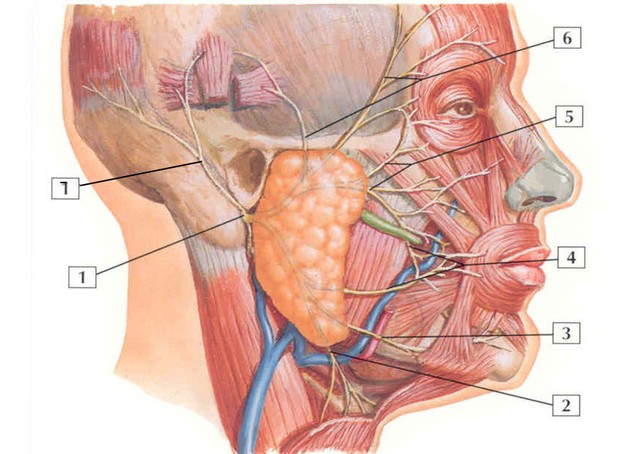Symptoms of salivary gland cancer
If you feel you have numbness or paralysis on your face, be careful with salivary gland cancer because in fact, 3 cases of facial paralysis have cancer.
Salivary gland cancer and symptoms
1. What is salivary gland cancer?
Salivary gland cancer is a form of head and neck cancer. Salivary gland tumors account for 3 - 6% of regional cancers in adults, with a frequency of 1-3 people / 100,000 people / year.
Although it is not a common disease in cancers, salivary gland cancer has a high mortality rate if not detected promptly. Because early detection is a prerequisite for patients to have many opportunities to cure the disease.
In the digestive organs, the salivary glands are responsible for secreting saliva that helps digest food and moisten the mouth, keeping the pH balanced for the mouth.
Salivary gland cancer develops from large salivary glands in the ears, under the jaw and under the tongue. Even small salivary glands located below the upper respiratory tract mucosa and the upper part of the gastrointestinal tract can also develop into cancer.
People at risk of salivary gland cancer are people aged 55 to 65. Benign tumors can appear about 10 years earlier.

Position salivary gland cancer.
The most common location of salivary adenoma is the parotid gland, accounting for 70-85% of cases. Other sites including lower jaw line (8-15%), sublingual route (<1%) and small salivary glands are most concentrated in hard arches (5-8%).
According to the research results, the smaller the salivary gland, the greater the likelihood of the tumor there being malignant. For example, parotid adenomas with 15-25% are malignant, 37-43% of subacute adenomas are malignant, and small salivary glands with over 80% are malignant.
Most tumors of salivary glands are benign. But there are also cases of benign tumors that turn malignant after a few years without treatment or surgery without taking the tumor or relapse.
2. Symptoms of salivary gland cancer
Salivary gland cancer is difficult to diagnose because tumors are scattered throughout the salivary glands. Moreover, the symptoms are quite poor. However, it may be based on the following symptoms to question whether you have salivary gland cancer:
- Numb part of the face.
- Swelling on the jaw or near the jaw, swelling in the neck or mouth.
- The muscles of one side of the face become weak.
- Persistent pain with unknown causes in the area of the salivary glands.
- Feeling difficult to swallow, difficult to open mouth.
Usually, patients go to the hospital when there is swelling in the salivary glands, difficulty swallowing, pain in the place with salivary glands, especially the feeling of numbness, hemiplegia.
According to the researchers, cases of facial paralysis almost all have cancer, so facial paralysis is a sign suggesting malignant neoplasms in the parotid gland, including salivary gland cancer. .
- Detecting new cancer-causing virus
- 7 causes of increased salivation
- Are there any symptoms of lymph nodes in the right neck?
- How to recognize early types of head and neck cancer
- Testicular cancer: Causes, symptoms and treatment
- The cancer has no symptoms early
- Measures to prevent and treat mumps effectively
- Symptoms of throat cancer
- Early detection of breast cancer leaving
- Colorectal cancer: Symptoms, causes and prevention
- Warning signs of skin cancer that you cannot see with the naked eye
- Dry eye syndrome
 Green tea cleans teeth better than mouthwash?
Green tea cleans teeth better than mouthwash? Death kiss: This is why you should not let anyone kiss your baby's lips
Death kiss: This is why you should not let anyone kiss your baby's lips What is salmonellosis?
What is salmonellosis? Caution should be exercised when using aloe vera through eating and drinking
Caution should be exercised when using aloe vera through eating and drinking